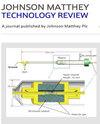使用热电偶进行可靠和可追溯的温度测量
IF 2
4区 化学
Q4 CHEMISTRY, PHYSICAL
引用次数: 0
摘要
温度是几乎所有工业部门中最常测量的过程变量,从化学工业到玻璃和陶瓷,制冷和发电。在许多制造过程中,连续温度控制是产品质量保证的重要组成部分,也是避免故障或在早期发现故障的问题。测量点可以位于不同的地方,如容器、管道系统、机器、烤箱或反应器中,其中可能涉及不同的气体、液体或固体介质,例如蒸汽、水、油或特殊化学物质。鉴于这些极其复杂的任务,灵活性是测量技术和信号处理的最重要的要求之一。这就是热电偶,由于其简单的设计,可以适应几乎所有的测量任务,变得相关。介绍了热电偶的基本设计和工作原理;解决了与校准、可追溯性和测量不确定度有关的问题。介绍了改进热电偶温度测量的最新进展。描述了新的,漂移优化的热电偶,新颖的设计和替代校准方法,并指定了它们优于传统热电偶或校准方法的优点。本文章由计算机程序翻译,如有差异,请以英文原文为准。
Reliable and Traceable Temperature Measurements Using Thermocouples
Temperature is the most frequently measured process variable in almost all industrial sectors from the chemical industry to glass and ceramics, refrigeration and power generation. During many manufacturing processes, continuous temperature control is an important part of product quality assurance and a matter of avoiding malfunctions or detecting them at an early stage. Measuring points can be located at different places such as in containers, pipe systems, machines, ovens or reactors, whereby different gaseous, liquid or solid media, for instance, steam, water, oil or special chemical substances may be involved. In view of these extremely complex tasks, flexibility is one of the most important requirements for measurement technology and signal processing. And this is where thermocouples, which can be adapted to almost all measuring tasks due to their simple design, become relevant. The basic design and operating principle of thermocouples are described in this paper; issues relating to calibration, traceability and measurement uncertainty are addressed. Recent developments to improve temperature measurement with thermocouples are presented. New, drift-optimised thermocouples, novel designs and alternative calibration methods are described, and their advantages over conventional thermocouples or calibration methods are specified.
求助全文
通过发布文献求助,成功后即可免费获取论文全文。
去求助
来源期刊

Johnson Matthey Technology Review
CHEMISTRY, PHYSICAL-
CiteScore
4.30
自引率
4.30%
发文量
48
审稿时长
12 weeks
期刊介绍:
Johnson Matthey Technology Review publishes articles, reviews and short reports on science enabling cleaner air, good health and efficient use of natural resources. Areas of application and fundamental science will be considered in the fields of:Advanced materials[...]Catalysis[...][...]Characterisation[...]Electrochemistry[...]Emissions control[...]Fine and speciality chemicals[...]Historical[...]Industrial processes[...]Materials and metallurgy[...]Modelling[...]PGM and specialist metallurgy[...]Pharmaceutical and medical science[...]Surface chemistry and coatings[...]Sustainable technologies.
 求助内容:
求助内容: 应助结果提醒方式:
应助结果提醒方式:


